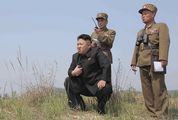APART from such minor details as human rights or gender equality, there is little about Qatar one can criticise.
Before the development of its oil and gas reserves began in the 1940s, it was one of the world’s poorest countries with an economy predominately driven by pearl fishing.
Today, with proven oil reserves of 15-billion barrels and gas fields that account for more than 5% of the global resource, it is the richest per-capita state in the world. None of its population of about 1.9-million lives below the poverty line and less than 1% is unemployed.
The Qatari Investment Authority, the sovereign wealth fund, has stakes in Volkswagen and Shell, football clubs and television networks. It also owns Harrods in Knightsbridge, London, where British meter Nazis take considerable pleasure from ticketing turquoise Lamborghinis belonging to Qatari officials.
Such wealth is useful in buying off potential critics — influential political families, potential pesky activists and monarchies are examples — as long as the people with the wealth stick to acceptable levels of wave-making.
Most of us recall the 2010 Fifa World Cup with mixed emotions. It was an opportunity to rubbish prematurely sensational claims made by various left-wing tabloids, from The New York Times to the Huffington Post, but it is hard to remember the event with unconditional affection.
This is due to Sepp Blatter and Match AG, the mild extortion racket dressed up as a hospitality agency that charged the length and breadth of the country threatening to park its tanks on the lawns of anyone celebrating South African spirit. When they left, we breathed a collective sigh of relief.
But then waves were made in the desert. On December 2 2010, Blatter emerged to announce that Qatar would host the 2022 Fifa World Cup. No sooner had he ended one of his rash-like soliloquies about how football made us all one, or how it would solve the issues of the Middle East or cure the pain of the Holocaust or apartheid, than questions emerged about the logic behind the host selection.
Traditionally the World Cup occurs in Europe’s summer, when temperatures in Qatar have been known to exceed 50°C. "At least the devil can attend," remarked an anonymous author to whom Blatter has been known to take exception.
Since then, it’s been said that Zinedine Zidane received $2m to act as the country’s bid ambassador, and alleged that the Argentine Football Association was given $79m for its vote. It is also alleged that one Fifa member asked for an education facility in his country in return for his vote, while another wanted an honorary knighthood.
It has also been claimed that immigrant workers who are building the stadiums are perishing in the heat at a rate of one a day. To their credit, the Qatari authorities have launched an investigation into claims that these workers — mainly impoverished Nepalese, Bangladeshis and Pakistanis — have not been paid, live in slums and had their identity documents confiscated (it wouldn’t be the first time a Middle Eastern state has dabbled in slavery, of course).
It can be argued that, given its structure and wealth, Qatar is simply doing what it feels it can and must. As the first Arab host of the World Cup, it has sought to diminish fears of the climate by channelling heat via solar panels into cooling systems within the stadiums. It also hosts the Aspire Academy — the $1.63bn sports facility equipped with cutting-edge technology designed to nurture young football talent (particularly Africans).
The country would be ill-advised, though, to expect a groundswell of tourism — it bans homosexuality, hangs rapists and isn’t partial to alcohol (never mind the weather; the last two items may be of particular concern to the contemporary English football fan).
The allegations will continue, but I suspect the country has simply used its oil money to reveal the real nature of Fifa.




















Change: 0.80%
Change: 0.61%
Change: -0.25%
Change: 0.13%
Change: 4.02%
Data supplied by Profile Data
Change: 1.13%
Change: 0.37%
Change: 0.80%
Change: 0.00%
Change: 0.33%
Data supplied by Profile Data
Change: -2.03%
Change: -1.51%
Change: -1.45%
Change: -2.26%
Change: -0.91%
Data supplied by Profile Data
Change: 0.07%
Change: 3.71%
Change: 2.65%
Change: 3.36%
Change: 4.99%
Data supplied by Profile Data